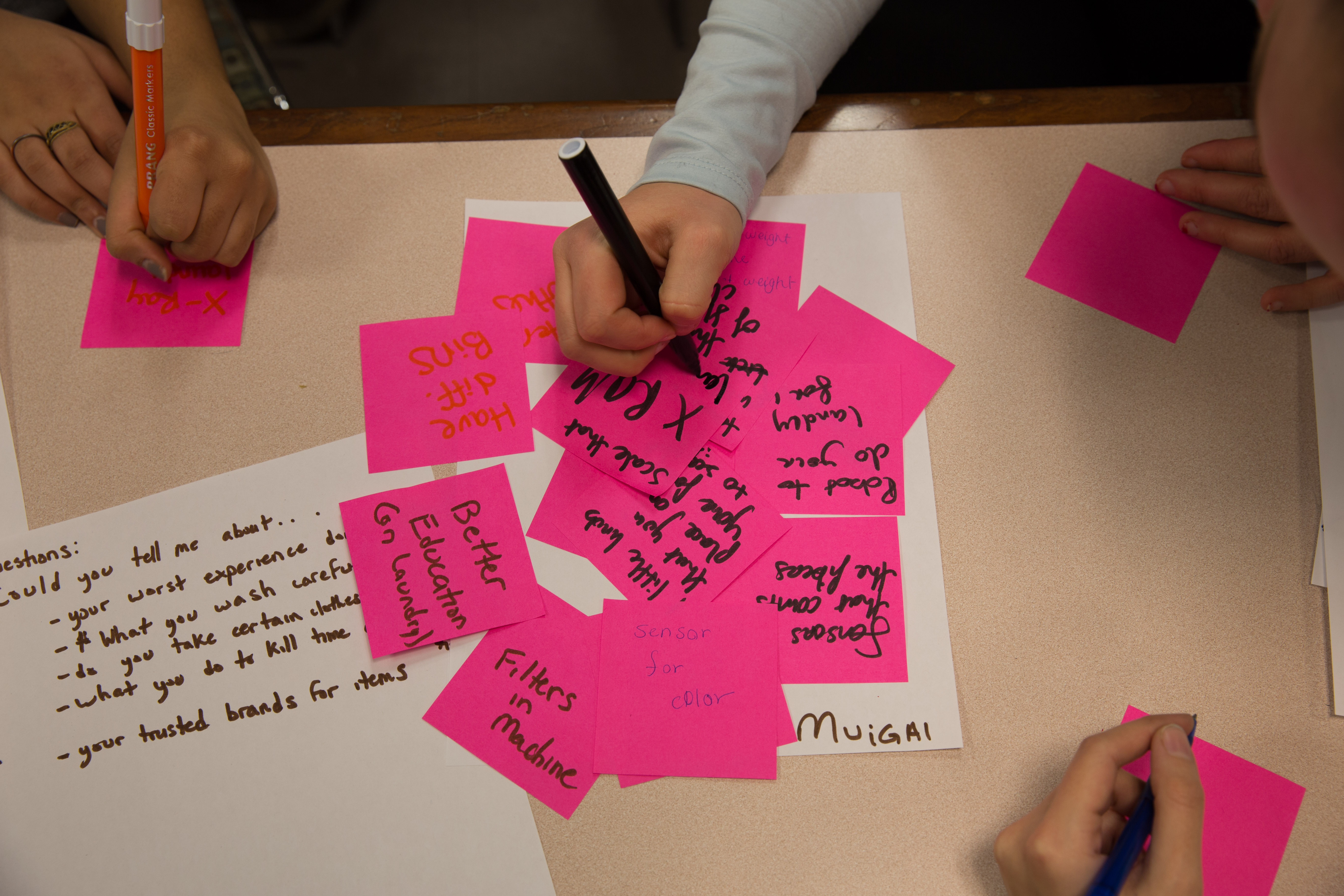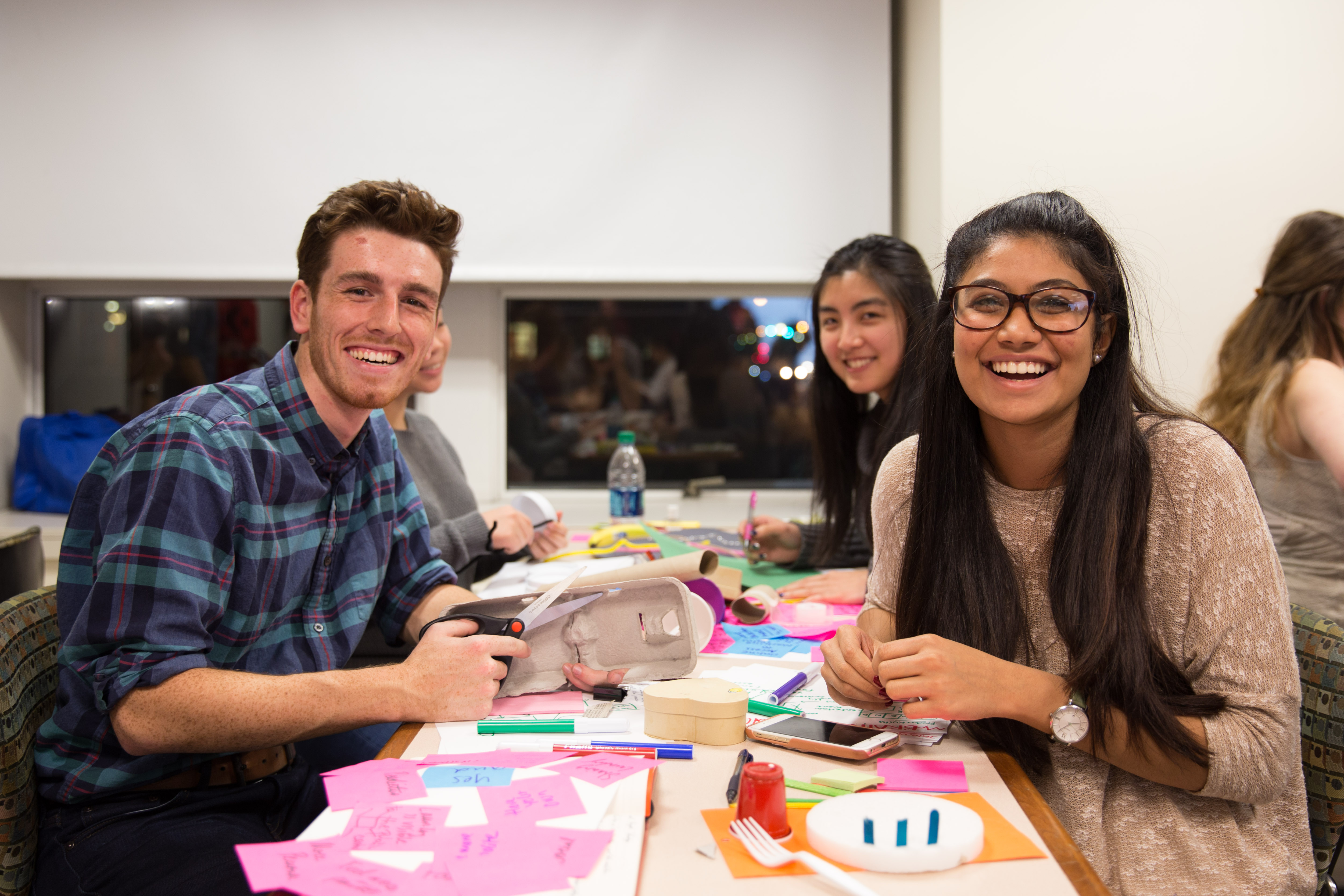
Scout Labs brainstorming solutions on sticky notes
Photo Credit: Nathan Hul
Executive Summary
Scout Labs is a multidisciplinary team of students who partner with local organizations as design consultants for social good. Through the Center for Community Service at Northeastern University, Scout Labs is connected with a local organization that tackles social issues in the Boston area. Throughout the course of the project, Scout labs works closely with their community partner to develop a solution, using a creative approach called Human Centered Design. In addition to creating positive impact in the Boston area, this partnership also provides the team with an educational experience that aims to create a more civically engaged design community at Northeastern University.
Design is a powerful tool for creating positive social impact and a tool that can benefit many organizations. Through empathy, research, and experimentation, design can deliver innovative and powerful solutions. Unfortunately, design is often a tool that organizations are unable to take advantage of. In particular, community organizations often lack the resources and design experience necessary to deliver the greatest amount of impact to their communities.
Scout Labs is a multidisciplinary team of students at Northeastern University that aims to tackle this issue by partnering with local organizations as design consultants. Through the Center for Community Service at Northeastern University, Scout Labs is connected with a local organization that works on creating positive change in the Boston community. By providing design work without a fee, Scout Labs is able to alleviate some of the workload that falls on their community partners as well as help develop solutions to social issues in the Boston area. In addition to creating positive impact, this partnership also provides the team with an educational experience and creates a more civically engaged design community at Northeastern University.
Current Project: Everyday Boston

Northeastern students at Scout's Design Thinking workshop
Photo Credit: Nathan Hul
This semester the team is working with Everyday Boston, an organization that uses storytelling and journalism to connect people throughout the city. Through a team of community volunteers, known as Story Ambassadors, Everyday Boston conducts interviews with locals that allows them to share their personal stories on the Everyday Boston website. In addition to their online presence, Everyday Boston also hosts community storytelling events as well workshops. The Scout Labs team has been working closely with their partner to define the role of the website and the way it fits into the organization's larger goal of promoting curiosity and connection. As a small team of volunteers, an important goal for the redesign is creating a platform that helps scale the organization. Currently, the Story Ambassadors conduct all of the interviews that appear on the website. This model is not scalable and a more sustainable approach would allow anyone to be involved in sharing stories. The site will solve this by introducing user-generated content that will appear in the form of prompts asking users to share their own stories. Another focus of the redesign is promoting both online and offline engagement by shifting the site from a typical blog to a community-building tool. The team will accomplish this goal by highlighting Everyday Boston’s community events and workshops, prompting users to get involved as well as incorporating discussion questions into each story.
Human Centered Design
Human Centered Design is at the core of how Scout Labs approaches problems and develops solutions. The process, also known as Design Thinking, is a collaborative methodology used to solve problems through both logic and creativity. It emphasizes exploration, experimentation, and ambiguity. As a result, the team begins the process without a clear deliverable in mind, allowing the team to be more open-minded to potential solutions. Each project begins with an intensive research stage that helps the team understand and empathize with the end users. The team then conducts extensive user interviews to frame and eventually define the problem. From there, a brainstorming process identifies potential solutions and the team begins developing prototypes. In the case of a website redesign, these prototypes would be sketches of the different screens of the site. Once the prototypes have been tested, they are refined and iterated upon, allowing the team to experiment with multiple solutions. Beyond simply producing solutions, Scout Labs aims to leave a lasting impact from the creative process and experimentation that takes place. Therefore, each stage of the process is carefully documented to make sure the findings are both understood and recorded for the future. Failures can be as important as successes, and documenting both helps ensure the same ideas don’t have to be tested again.
Scout Labs emphasizes working with their clients as partners instead of working for them. Clients are active participants throughout the design process and work closely with the team to brainstorm and problem-solve. This close partnership allows the team to develop sustainable solutions that extend beyond the timeline of the partnership.
Multidisciplinary Teams
One of Scout Labs’ greatest strengths is its cross-disciplinary approach. Teams are made up of students with backgrounds that can range from design and computer science to economics and behavioral neuroscience. This range is possible because of Northeastern’s breadth of programs, and it is what makes Scout Labs different from private sector design consultants, where cost and time often shrink the skill sets of the assembled team. Scout’s ability to draw from across the University provides the team with a broader perspective that leads to more creative and successful solutions.
Scout Labs also strives to provide each member of the team with an educational experience that helps shape the way they approach design. Many team members do not come from design backgrounds; however, Human Centered Design extends far beyond visual aesthetics. It encompasses the way people build products and create solutions. Scout Labs firmly believes design is a powerful multidisciplinary tool that is an important part of a student’s education. Through it students gain an understanding of how Human Centered Design can be used as a way to create innovative solutions. Furthermore, it builds creative confidence among students who may not see themselves as creative. Scout Labs emphasizes that both design and creativity are learned skills that are applicable in many different fields.
Challenges
As a team of students, Scout Labs recognizes that they are limited in their experience and in their knowledge. To combat this, the team makes sure to seek out feedback and help from experts in the field at each step of the way. This can manifest in the form of informational interviews, surveys, or project critiques. By continually receiving feedback, the team is able to craft more successful and creative solutions. Furthermore, this feedback process is an important opportunity for members to challenge themselves as well as further develop their skills. Another tough challenge the team faces is measuring success. For every project, success can look very different. As a result, there is no one-size-fits-all way of measuring how successful a project is. Scout Labs tackles this challenge by working closely with the client to define a goal statement early on in the project. This statement guides the team throughout the course of the project and is used as a way to evaluate the project’s progress.
Author Bio
Sabrina Kantor
Sabrina Kantor is the current Scout Labs Director as well as a Computer Science and Interactive Media major at Northeastern University.


